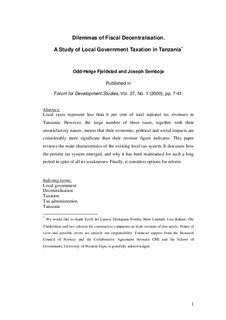Dilemmas of fiscal decentralisation: A study of local government taxation in Tanzania
Journal article, Peer reviewed

Permanent lenke
http://hdl.handle.net/11250/2475421Utgivelsesdato
2000-01-01Metadata
Vis full innførselSamlinger
- Publications [1488]
Originalversjon
in Forum for Development Studies vol. 27 no. 1 pp. 7-41 10.1080/08039410.2000.9666122Sammendrag
Local taxes represent less than 5 percent of total tax revenues in Tanzania. However, the large number of these taxes, together with their unsatisfactory nature, means that their economic, political and social impacts are considerably more significant than their figure implies. This paper reviews the main characteristics and impacts of the existing local tax system. It discusses how the present tax system emerged, and why it has been maintained for such a long period in spite of all its weaknesses. Furthermore, it considers options for reform. An important component of the ongoing decentralisation reform in Tanzania is to increase the fiscal autonomy of local authorities. This policy is encouraged and partly initiated by the donor community. The paper suggests that care must be taken in implementing this policy. It is unrealistic to expect that the present administration in many local authorities has adequate capacity and the required integrity to manage increased fiscal autonomy. In fact, there is a real danger that, in the absence of substantial restructuring of the current tax system combined with capacity building and improved integrity, increased autonomy will raise mismanagement and corruption.
Serie
Forum for Development Studies vol. 27 no. 1Forum for Development Studies vol. 27 no. 1